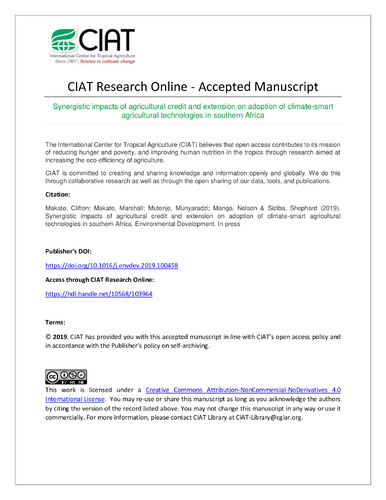Synergistic impacts of agricultural credit and extension on adoption of climate-smart agricultural technologies in southern Africa
Abstract
Institutional credit and extension services are critical inputs that can reduce scaling challenges in agricultural development interventions if accessed by farmers. Using household level survey data from Zimbabwe and Malawi, this article seeks to contribute to the existing literature by examining impacts of separate and joint access to credit and extension services on climate-smart agricultural (CSA) technologies adoption. Using inverse-probability weighting regression adjustment and propensity score matching this study found out that access to either extension or credit significantly progresses CSA technology adoption. However, access to extension services only proved to be more effective in enhancing CSA technology adoption than access to credit alone. More importantly, results show enhanced collective impact of simultaneous access to credit and extension on CSA technology adoption. Further, joint impacts of credit and extension on adoption were found to be less pronounced in youthful and women farmer groups compared to their old and male farmer group counterparts respectively. Results call for prudent policy and institutional strategies in improving access to credit and extension services in Malawian and Zimbabwean smallholder farming that are mindful of disadvantaged groups such as youth and women farmer groups in order to improve adoption and upscaling of CSA technologies. Possible options include; improving number of extension workers at village level, increasing youth and women extension agent numbers, capacity building of extension personnel and institutions, and increasing financial support to national extension programs.

